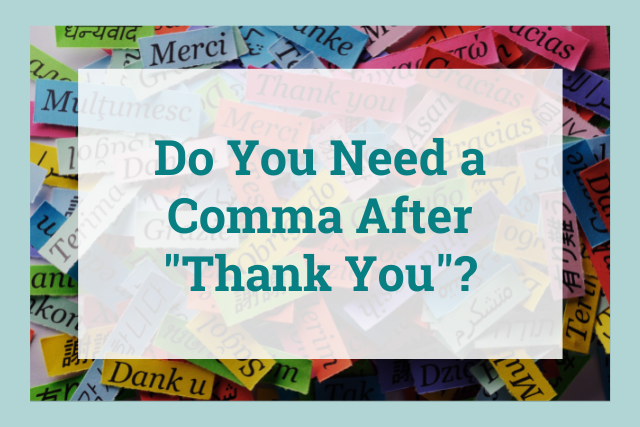
You’ve just finished writing an important email to a colleague and want to thank them for their time.
You’re sending a thank you letter to a friend to say you appreciate their help.
In both of these scenarios, you’ll use the phrase "thank you" to express gratitude and (in the first example) to signal the end of your email.
But what is the correct punctuation to use? Do you even need punctuation at all? Unfortunately there isn’t one simple grammar rule that can answer this for us.
In this article, we’ll look at the different ways you can use "thank you" in a sentence, and when you do (and don’t) need a comma.

Do You Need a Comma After "Thank You"?
There are a few different ways to use the phrase "thank you," and they each require using commas in different ways.
One is to thank someone directly:
- "Thank you, Zainab."
Another is to describe the act of thanking someone:
- "I wanted to thank you for the card you sent me."
As you can see, we used a comma in the first example, but we didn’t in the second. Why?
Is It Always Right to Use a Comma After "Thank You"?
Let’s take a look at some more examples:
- "I wanted to thank you for the flowers you sent me."
- "You’ve been given the medal to thank you for your service."
- "I must thank you for the effort you put into the project."
In these sentences, we’re technically not using the phrase "thank you."
"But it’s right there!"
I know. But in this sentence, "thank" and "you" are two words performing separate roles. Here, to thank is a verb denoting the action of thanking someone. You is the object of that verb (the person receiving the action). We could change "you" for a different object, and the sentence would still make sense:
- "I wanted to thank him for the card he sent me."
In this case, it would be wrong to use a comma after "thank you," in the same way that you don’t need a comma after "him" in the sentence above.
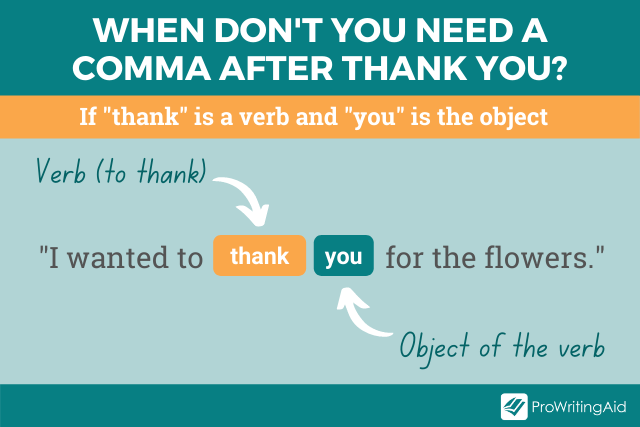
Do I Need a Comma After Using "Thank You" as a Noun?
You can also use "thank you" to describe something like a note or gift:
- "I want to send her a thank you for all the help she’s given me."
When you’re using "thank you" in this way, you don’t need a comma.
As with all comma rules, this can get confusing. For example, some people use "thank you" as a noun:
- "I sent him a thank you, but he never replied."
- "The department bought you this gift certificate as a thank you for directing the school play."
In these examples, "a thank you" refers to an idea or sentiment. When you use "thank you" in this way, you don’t need to place a comma after it.
In the first example, there is a comma after "thank you," but that is because of the sentence structure, not the phrase. If we add "note" to this sentence, you can see that the comma moves to fall after "note":
- "I sent him a thank you note, but he never replied."
That’s a lot of rules, right? Fortunately, the most common way to use "thank you" is like in the first example, for direct address.
Is It "Thank You, John" or "Thank You John"?
This one’s easy: You always need a comma after thank you when you are addressing someone directly.
That means it’s "Thank you, John."
Adding a comma here separates the statement from the name of the person being thanked.
This works the same even if you are thanking more than one person:
- "Thank you, everyone!"
- "Thank you, Joan, Jessica, and Mark."
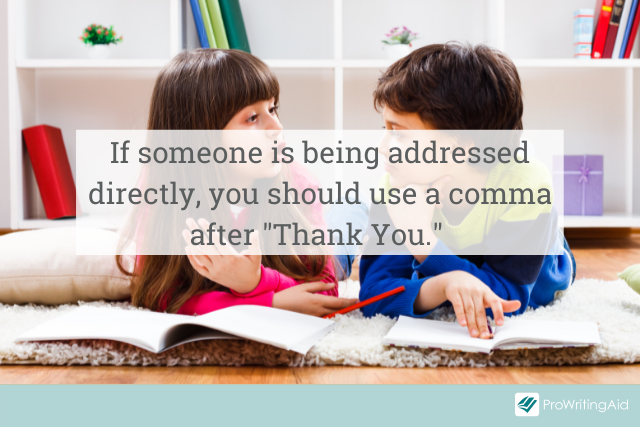
Sometimes, your sentence will continue after the phrase "thank you, [name]." For example:
- "Thank you, Pamela, for sorting out the filing system."
If your sentence continues after the person’s name, add a second comma after their name to separate it from the rest of the sentence. This is because "Thank you, Pamela." is a complete sentence on its own.
Do You Need a Comma After "Thanks"?
The same rule applies here: add a comma after "thanks" if someone is addressed directly in your sentence.
- "Thanks, Marcus!"
- "Thanks, everyone, for your time."
There is one use of "thanks" that doesn’t require a comma after.
If you use "thanks" as a noun (to refer to an idea or sentiment), you don’t need a comma:
- "Let us give thanks for this meal."
The only time you’ll need a comma after "thanks" in this scenario is if the sentence structure requires it:
- "I went there to give thanks, but the area was too crowded."
The comma in that sentence isn’t there because we’ve used "thanks," but rather to separate the two parts of the sentence.
If you need help understanding where to place a comma in your sentences, use ProWritingAid. It will highlight places where you’ve missed a comma, and explain why one is needed.
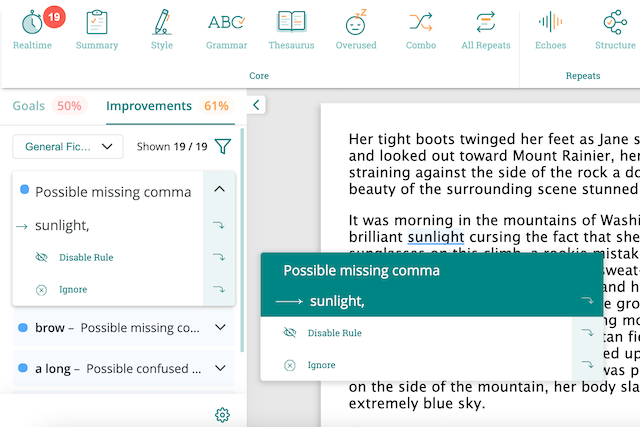
Should You Use a Comma After "Thank You" in an Email Salutation?
Yes. Here’s what that looks like.
Hi Sara,
I hope you’re well! I heard your podcast episode about comma rules, and I wanted to invite you to speak at an event next month. Could you let me know your speaker fees, please?
Thank you,
Damien
As you can see, we use a comma after the opening salutation (Hi Sara) and the closing salutation (Thank you).
The same rule applies for "Many thanks," or for any other closing salutation you might use. Add a comma after the salutation, before your name.
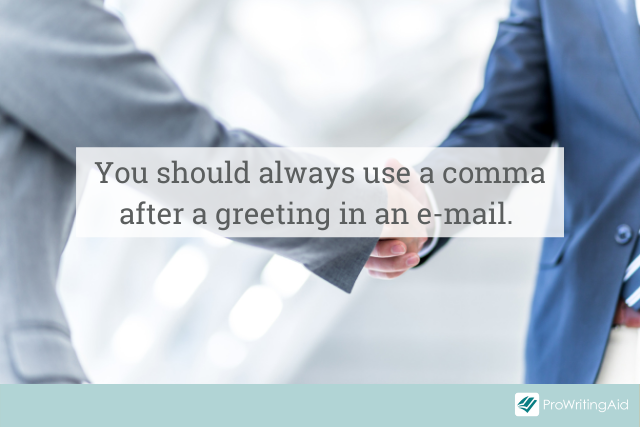
Is It "Thank You, Again" or "Thank You Again"?
If you're feeling particularly polite, you might have thanked someone a couple of times in your email and want to sign off with "Thanks again" or "Thank you again."
As you can see, you don't need a comma after "thanks" or "thank you" in these phrases.
However, you should still add a comma after "again" to separate the salutation from your name.
Whenever you use an email salutation (like "Sincerely," "Yours truly," "Kind regards") the format should be:
[Salutation],
[Name]
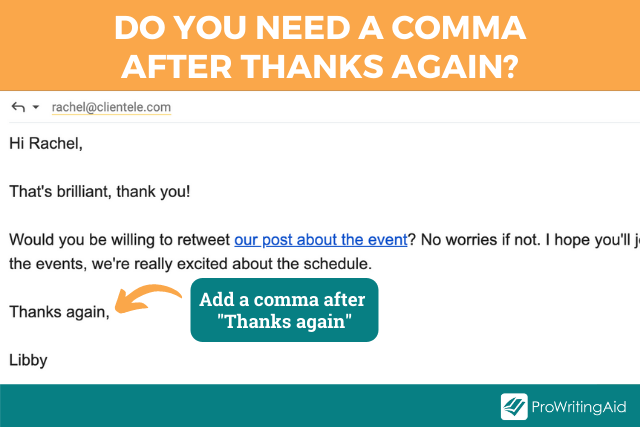
Notice how we add a return (hit the enter key) between the salutation and your name.
Is It "No Thank You" or "No, Thank You"?
While we’re talking about thank yous and commas, we thought we might as well answer this question, too.
"No, thank you" is used to say no to something, but thank you anyway:
"Would you like an ice cream?"
"No, thank you."
"No thank you" isn’t a grammatically correct sentence, however you could say something like:
- "He just took the lasagne; no thank you, no goodbye."
This means that the person who took the lasagne didn’t say "thank you." How rude!
What Are Some Examples of Using "Thank You" in a Sentence?
Thank you, reader, for trusting us to teach you these comma rules.
Think you know your stuff now? We've taken the commas out of these sentences. Try placing (or not placing!) the commas where they belong. (Hint: Even if there doesn’t need to be a comma after "thank you," you may need one somewhere else in the sentence.)
Thank you Sarah.
I gave her some chocolates as a thank you for looking after my dog.
No thank you I don't need anything from the store.
Thank you for being my friend.
To say thank you for sacrificing your time we'd like to give you an extra week's holiday.
I still need to send out the thank you notes from my birthday.
He wanted to thank you in person but he missed his flight.
And here are the answers:
Thank you, Sarah.
I gave her some chocolates as a thank you for looking after my dog.
No, thank you, I don't need anything from the store.
Thank you for being my friend.
To say thank you for sacrificing your time, we'd like to give you an extra week's holiday.
I still need to send out the thank you notes from my birthday.
He wanted to thank you in person, but he missed his flight.
Can I Leave the Comma Out of "Thank You, John"?
So, if someone thanks you by name without including a comma, should you be offended?
People often leave the comma out of the phrase Thank you, [Name] in casual contexts, like when messaging a friend.
But if you’re writing a letter or important email, or punctuating dialogue in a novel, make sure you include the comma.
Looking for more comma help? Check out our Grammar Guide.


